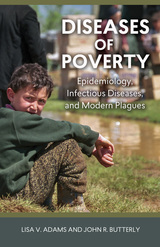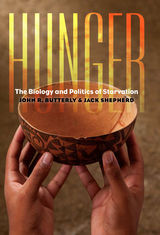2 books about Butterly, John R.

Diseases of Poverty
Epidemiology, Infectious Diseases, and Modern Plagues
Lisa V. Adams and John R. Butterly
Dartmouth College Press, 2015
Only a few decades ago, we were ready to declare victory over infectious diseases. Today, infectious diseases are responsible for significant morbidity and mortality throughout the world. This book examines the epidemiology and social impact of past and present infectious disease epidemics in the developing and developed world. In the introduction, the authors define global health as a discipline, justify its critical importance in the modern era, and introduce the Millennium Development Goals, which have become critical targets for most of the developing world. The first half of the volume provides an epidemiological overview, exploring early and contemporary perspectives on disease and disease control. An analysis of nutrition, water, and sanitation anchors the discussion of basic human needs. Specific diseases representing both “loud” and “silent” emergencies are investigated within broader structures of ecological and biological health such as economics, education, state infrastructure, culture, and personal liberty. The authors also examine antibiotic resistance, AIDS, malaria, tuberculosis, and pandemic influenza, and offer an epilogue on diseases of affluence, which now threaten citizens of countries both rich and poor. A readable guide to specific diseases, richly contextualized in environment and geography, this book will be used by health professionals in all disciplines interested in global health and its history and as a textbook in university courses on global health.
[more]

Hunger
The Biology and Politics of Starvation
John R. Butterly and Jack Shepherd
Dartmouth College Press, 2010
The Universal Declaration of Human Rights, adopted by the United Nations in 1948, recognizes the individual’s right “to a standard of living adequate for the health and wellbeing of himself and his family, including food, clothing, housing, and medical care.” More than sixty years later, despite the rapid advancement of science and technology and the proliferation of humanitarian efforts, inadequate nutrition remains a major health and social problem worldwide. Food insecurity—chronic malnutrition, persistent hunger, even starvation—still afflicts more than one in seven of the world’s people. As Butterly and Shepherd show, hunger is not the result of inadequate resources and technologies; rather, its cause is a lack of political will to ensure that all people have access to the food to which they are entitled—food distributed safely, fairly, and equitably. Using a cross-disciplinary approach rooted in both medicine and social science to address this crucial issue, the authors provide in-depth coverage of the biology of human nutrition; malnutrition and associated health-related factors; political theories of inadequate nutrition and famine; historical-political behaviors that have led to famine in the past; and the current political behaviors that cause hunger and malnutrition to remain a major health problem today.
[more]
READERS
Browse our collection.
PUBLISHERS
See BiblioVault's publisher services.
STUDENT SERVICES
Files for college accessibility offices.
UChicago Accessibility Resources
home | accessibility | search | about | contact us
BiblioVault ® 2001 - 2024
The University of Chicago Press









